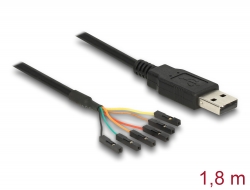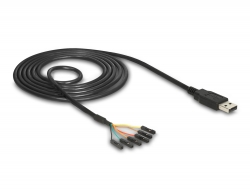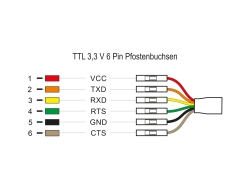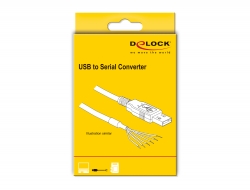Delock USB 2.0 to Serial LVTTL Converter with 6 pin header female separately 1.8 m (3.3 V)
Description
This USB 2.0 to TTL converter by Delock can be connected directly to GPIO (General purpose input / output) connectors or UART (Universal Asynchronous Receiver / Transmitter) interfaces. The converter is suitable for applications on single-board computers, controllers, FPGAs, MCUs and in circuit electronics etc.
Specification
- Connectors:
1 x USB 2.0 Type-A male >
1 x TTL 3.3 V 6 pin header female separately - Chipset: FTDI FT232RL
- Cable gauge: 26 AWG
- Compatible to UHCI / OHCI / EHCI controller
- Data transfer rate up to 3 Mbps
- Databits: 7 or 8
- Stop bits: 1 or 2
- Parity: none, space, even, odd, mark
- Flow control: none, hardware RTS / CTS, software XON / XOFF
- FIFO:
128 Byte - RX
256 Byte - TX - Cable length incl. connectors: ca. 1.8 m
- Operating temperature: -20 °C ~ 80 °C
System requirements
- Linux Kernel 2.6 or above
- Mac OS 10.5 or above
- Windows CE 4.2/5.0/6.0
- Windows XP/XP-64/Vista/Vista-64/7/7-64/8.1/8.1-64/10/10-64/11
- PC or laptop with a free USB Type-A port
Package content
- Converter USB 2.0 serial TTL
- Driver CD
- User manual
Package
- Retail Box
General
Function
• Plug & Play
Specification
• TTL/CMOS
Supported operating system
• Linux Kernel 2.6 or above
• Mac OS 10.5 or above
• Mac OS 10.6 or above
• Windows 10 32-Bit
• Windows 10 64-Bit
• Windows 7 32-Bit
• Windows 7 64-Bit
• Windows 8 32-bit
• Windows 8 64-bit
• Windows 8.1 32-Bit
• Windows 8.1 64-Bit
• Windows 11
• Mac OS 10.5 or above
• Mac OS 10.6 or above
• Windows 10 32-Bit
• Windows 10 64-Bit
• Windows 7 32-Bit
• Windows 7 64-Bit
• Windows 8 32-bit
• Windows 8 64-bit
• Windows 8.1 32-Bit
• Windows 8.1 64-Bit
• Windows 11
Interface
Connector 1
• 1 x USB 2.0 Type-A male
Connector 2
• 1 x 6 PIN pin header female seperate
Technical characteristics
Chipset
• FTDI 232R
Data transfer rate
• 300 bps - 3 Mbps
FIFO
• 256 Byte
• 128 byte
• 128 byte
Operating temperature
• -20 °C ~ 80 °C
Voltage
• VCC = 5 V
Physical characteristics
Cable length
• 1.8 m
Conductor gauge
• 26 AWG
Colour
• black
11.04.2024
Datenblatt
11.04.2024
Data sheet
11.04.2024
Dane produktu
11.04.2024
Popis produktu
11.04.2024
Feuille de données
11.04.2024
Hoja de datos
11.04.2024
Datablad
11.04.2024
Adatlap
11.04.2024
Kataloški list
11.04.2024
Φύλλο δεδομένων
11.04.2024
Scheda tecnica
11.04.2024
Fișă cu date
03.06.2022
CE - Declaration of conformity
248.24 kB
23.03.2018
Technical drawing
864.93 kB
08.09.2022
User Manual Multilingual
305.41 kB
MAC OS X 10.9 or above
80.75 kB
Max OS X device driver setup installation
28.08.2017
Windows 7 / 8 / 8.1 / 10
1.66 MB
Windows device driver setup installation
28.08.2017
Windows 7 / 8 / 8.1 / 10 / 11 / 2012 / 2012R2 / 2016
2.11 MB
Windows Treiber / Driver
Version 2.12.36.4
27.09.2021
similar items











All names and symbols mentioned here are property of the respective producer. Printing errors, changes and errors excepted.

Delock USB 2.0 to Serial TTL Converter with 6 pin header female separately 1.8 m (5 V)
Item No. 83786

Delock USB 2.0 to Serial TTL Converter with 6 open wires 1.8 m (3.3 V)
Item No. 83117

Delock Converter USB 2.0 male > TTL 6 pin pin header female 1.8 m (3.3 V)
Item No. 83785

Delock Converter USB 2.0 male > TTL 2.5 mm 3 pin stereo jack male 1.8 m (3.3 V )
Item No. 83789
Delock Converter USB 2.0 male > TTL 3.5 mm stereo jack 1.8 m (3.3 V)
Item No. 83114

Delock Converter USB 2.0 Type-A male to Serial TTL 3.5 mm 4 pin stereo jack 1.8 m (3.3 V)
Item No. 83779

Delock Converter USB 2.0 male > TTL 2.5 mm 3 pin stereo jack male 1.8 m (5 V)
Item No. 83788

Delock Converter USB 2.0 Type-A male to Serial TTL 3.5 mm 4 pin stereo jack 1.8 m (5 V)
Item No. 83778
Delock Converter USB 2.0 Type-A male to Serial TTL 3.5 mm 3 pin stereo jack 1.8 m (5 V)
Item No. 83115

Delock Converter USB 2.0 male > TTL 6 Pin WR-WTB 2,2 m (3,3 V)
Item No. 84957
Other interface variant

Delock Converter USB Type-C™ 2.0 male to LVTTL 3.3 V 6 pin pin header female separate 2.0 m
Item No. 63946




















